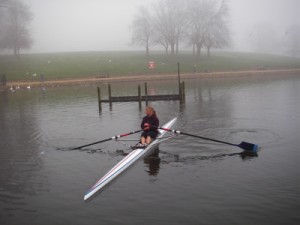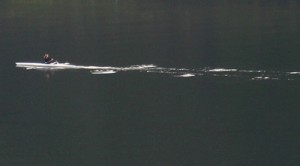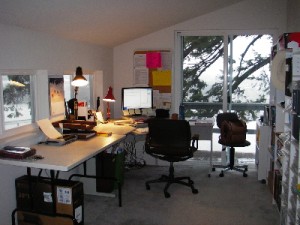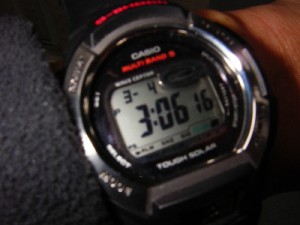09 Mar 2007, Leeds, UK

One frozen, foggy, frosty day in December Roz and I were filmed and interviewed by Yorkshire TV in Roundhay Park in Leeds, and later at my home. The resulting TV documentary will be shown in the Yorkshire area on March 12th - one year minus one day since Roz' arrival in Antigua at the end of her epic row across the Atlantic. The title of the programme will be "Is it worth it?", part of a series of 12 interviews with people who have done things a bit out of the ordinary.
It is a pity that most of you reading this blog will not be able to view it. I am certainly looking forward to seeing what they have made of all the material that they have taken. This includes photographs of Roz as a child, her video tapes made before and during the rowing race, interviews in the park, and one to one interviews here at the house.
Roz and I both came up with very positive views about whether it was all worth it, and I hope that this comes over strongly during the half-hour viewing. Even though you may not be able to see it, I trust that you will continue to support Roz in her adventure, knowing how important it is to her.
|
|

Well, maybe not a cruise exactly, as cruising doesn't normally involve blood, sweat and blisters.
My training is coming along well. As well as weights, circuits, running, yoga, racquetball and rowing on a rowing machine, I've been out in my Maas Aero sculling boat on the Columbia. My longest outing so far has been from the Hood River marina to Mosier and back - a distance of about 14 miles. Not a bad training session (about 2 hours) but still a long way short of the 8 hours a day I'm aiming to do on the Pacific.
Much as I like my WaterRower rowing simulator, it makes SUCH a nice change to get out on the water when conditions allow. The time passes a lot more quickly when the scenery is changing. And being chased down the river by a barge the size of a small town gives me a powerful incentive to keep paddling hard.
I'm keeping my boat in a friend's boathouse in the marina. It's very convenient as it saves me loading the Aero onto the top of Quackers (my yellow truck) every time I go rowing, but launching and disembarking in the narrow confines of the boathouse is a delicate balancing act. The boat is unstable until the oars are in the oarlocks and extended perpendicular to the boat, and there isn't room to do that inside the boathouse, so I have to partially extend them and then try to hold the boat level as I step in and push out. My training rows haven't turned into training swims just yet, but I'm sure it's only a matter of time...
[Photo by Eric Sanford, taken from the deck of our house]
|
|

I've been in one place for nearly two whole weeks now - woohoo! This is the first time that I've been in any one place for a LONG time. It's given me a chance to set up a study at Eric's house, with a proper desk and monitor and files and all the things I need in order to work efficiently. I'm proud of my ability to work while on the road, but it makes a nice change to have some stability and get my technological infrastructure sorted out.
Notice that I prefer to call it a 'study' rather than an 'office' - after 11 not-so-enjoyable years working as a management consultant I am still celebrating my freedom, and the O-word still brings me out in a palpitations....
|
|

This is my lovely new G-Shock watch from the people at Casio. During the Atlantic row my old G-Shock was one of my most cherished pieces of equipment. Solar-powered, it never needed a new battery, and with up to 4 alarm settings, I could use it to tell me when another ten minutes of my shift had passed once it got too dark to see my watch without stopping rowing to press the illumination button. It also updates the time automatically from a time calibration signal sent from Germany, to ensure 100% accuracy.
I don't need an atomic watch, though, to tell me that time is ticking away. I've got just 4 months before I am due to launch from San Francisco, and lots still to do.
Unless there are any major disasters, I will be ready in time - it's just a question of how many bells and whistles I can add. But if every expedition waited until the preparations were 100% ready, no project would ever get off the ground. There is always more that can be done. Provided I've got an ocean-ready boat and all the safety aspects have been taken care of, I'm happy to set myself a deadline and stick to it.
|
|